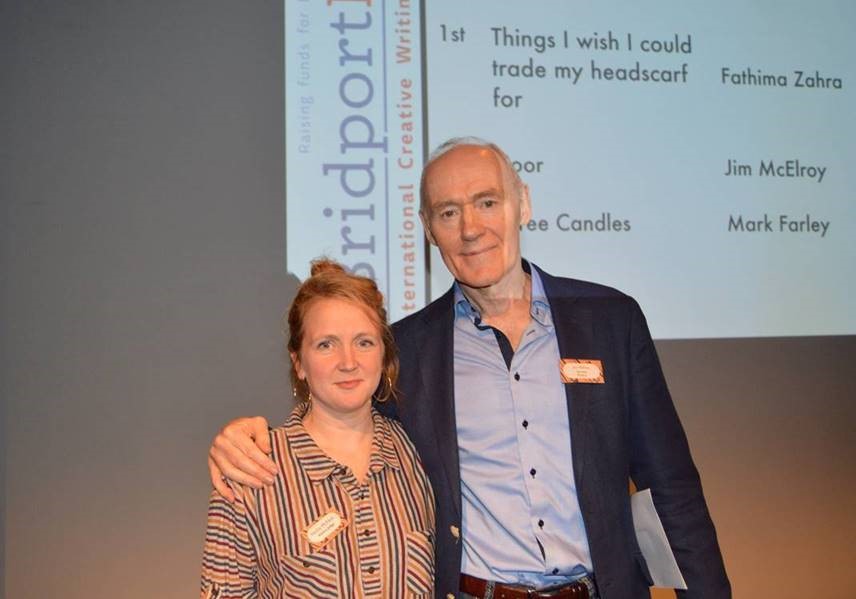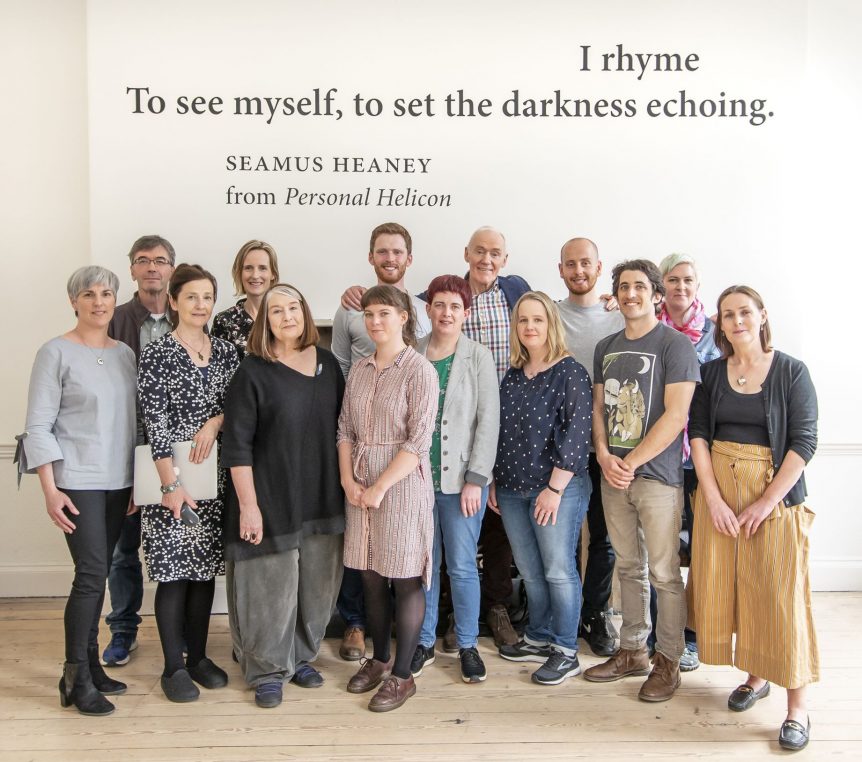What are your earliest memories regarding being interested in writing and or poetry?
My earliest writing memory involves chocolate; around the age of eight, I remember entering a national writing competition run by Cadbury’s, and winning a certificate and a box of chocolates for an essay I’d written. Given my sweet tooth, I think that lit a fire in me and I spent the next few years scribbling furiously on the kitchen table, tho’ I don’t recall ever winning another box. I also recall learning poems off by heart and reciting James Reeves’ ‘Fireworks’ at a school play, so maybe I have Cadburys to thank for my impulse to write and recite.

Were you encouraged at school or by your family?
Growing up on a farm in the Mournes, with no nearby library, I can’t claim unbridled childhood access to literature. Like many of my generation, books were in short supply. I think my ear for words came from the storytelling that was integral to the rural conversation of my parent’s generation. I was blessed with wonderful uncles and aunts who could tell a great story, always with a killer punch line; one or two of them also liked to recite poetry. The radio was also a great source of new words, so I think my biggest influence was the spoken rather than the written word; I think that gave me a natural ear for the sound of words and for storytelling.
At college, languages featured heavily during my seven years at boarding school, including English and French to A-Level. I’ve always loved the study of words and had a forensic attention to every syllable – often not only learning quotes off by heart, but punctuation as well. It didn’t really matter what language; I remember translating every word in La Peste by Camus and will never forget the first moment I saw ‘A povre widwe somdel stape in age, was whilom dwelling in a narwe cotage’, in Chaucer’s Canterbury Tales; that was like being transported back in time.
My biggest teaching influence was an inspirational English teacher called Sean Holywood, a charismatic man with a love of the Arts, so much so that the arts centre in Newry is now named after him. I studied A level English with Mr Holywood and he introduced me to everything from Wordsworth and Hardy to Shakespeare; also Kavanagh, Beckett, Yeats. I still feel Mr Holywood around when I’m writing.
Did you carry on after school – University or College – English Literature or similar avenues?
No. I’d love to have gone on to study of English literature at third level; however, my University degree choice took me in an entirely different direction. After studying Business at Queens University, Belfast, I completed articles in accountancy in KPMG, then spent the majority of my career in business and technology. Now that I’m semi-retired and have found some space in my life again, here I am back, 42 years later, happily sitting at the blank page chewing my pen, trying to win some more chocolates.

Did you attend writers’ groups or creative writing classes?
Yes. My writing really began in earnest in summer 2017 when Deirdre Cartmill became my first tutor; Deirdre was extremely encouraging about my writing and gave me a wonderful introduction to the fundamentals of poetry. During 2018 and 2019, I attended both the Ruth Carr Reading group and Moyra Donaldson’s Creative writing class at the Crescent Arts Centre; both have been fantastic and helped broaden my reading and writing experience. Moyra still acts as my poetry writing mentor, I’ll always be grateful to her for encouraging me to enter a portfolio of my poems for Poetry Ireland Introductions series 2019.
Which writers or poets have influenced you?
As one of nine children from a farm in the Mournes, who spent seven years at boarding school – ‘away at school’ – to quote one of his lines, I’ve always felt a spiritual connection with the poetry of Seamus Heaney; I feel a powerful connection with all of the themes in his writing. After my father died suddenly whilst working the land, I adopted Heaney’s poem ‘Digging’ as my prayer to my father – I still recite it regularly.
Whilst I remained a casual reader of poetry during my working life, my primary influences stem from college days reading Shakespeare, Hardy, Bronte, Wordsworth, Chaucer, Beckett, Camus and the many great Irish writers, Yeats, Kavanagh, Montague, Heaney.
Through my involvement with Ruth Carr, Moyra Donaldson, and Helen Ivory, my poetry reading has widened; it’s always a joy to discover the work of poets that I’ve not yet read; my reading cabinet is stacked with many local writers; Sinead Morrissey, Jean Bleakney, Montague, Damian Smyth, Michael Longley, Paul Muldoon, Moyra Donaldson. I’m currently reading poetry by Mark Doty, Paul Muldoon, Stephen Sexton, RS Thomas, Billy Collins.
Now that I’ve got to know Hollie McNish through the Bridport Awards, its great to read people like Hollie, Kate Tempest, Danez Smith and see how they are helping to bring new audiences into poetry. To help deepen my understanding of craft, I like to read instructional books – including books by Mary Oliver and Peter Sansom.
What themes are you exploring in your work?
I’m finding my writing explores a wide range of themes though most of them share a common purpose in that they often grapple with the impact of change. Having grown up close to nature, my rural childhood often plays out through poetry on climate change and how we treat our environment. In the technology sector, where change is the only constant, having watched technology move out of its glass rooms, beyond the office, into our homes and pockets, the impact of technological change gives me lots of raw material; even the cows on our farm are now milked electronically.
My three poems in the 2019 Cap Arts Anthology are examples, Dung Dot Org’ is a bit of a rant at the lack of regulation on the internet; My time at Animal school reflects on the lost idyll of rural life; ‘Banana Weeks’ writes about the change brought by ageing, as does my poem ‘Chiselled’ which was published in the Honest Ulsterman. Having lived through the 30 years of the Troubles, I’ve also found myself writing about the changes brought by war, and the change from war to peace.
Do you work on technique – the mechanics of language – or are you working more on instinct?
Whilst instinct is important, I see it as essential to work on technique; like most things in life, I find poetry requires as much perspiration as it does inspiration. Initially in my drafting it is important for me to be unafraid of where my subconscious might steer me, but it can’t all be about a stream of consciousness. I’m very aware of the need to take care over the mechanics and try to read and study as many poets as possible to develop my understanding of craft and technique. I enjoy experimenting with form, the rhythms and sounds of language and see my writing as a process of continual learning. I’ve great respect for people like Moyra Donaldson, Ruth Carr, Damian Smyth, Deirdre Cartmill, Martina Evans, Helen Ivory, and others who have acquired wisdoms from many years of writing. Continuing to work on technique and improving craft through reading, listening learning will always be central to my writing.

Given your recent success – where to now?
Being selected by Poetry Ireland for the 2019 Introductions series has been a wonderful confidence boost, as is having my poem ‘Hoor’ chosen by Hollie McNish as runner-up for the 2019 Bridport Poetry Prize. I know how many great writers there are out there; the Bridport award committee told us they had over 3,900 entries from 89 countries, so I feel blessed to have been recognised in this way and fortunate to have this opportunity to write.
I still hear Poetry Ireland Introductions judge Martina Evans in my ear; Martina told me I was to have confidence in my writing and that it was time to develop a body of work that does justice to my selection. Jean Bleakney, who has been very encouraging, tells me that the revered American poet Amy Clampitt produced her first major poetry collection in her 60’s; so I think that getting my first collection out by 65 is a worthy objective.
My plan has to be to commit myself to doing justice to the trust that Poetry Ireland, the Bridport Awards committee and others have placed in my poetry. I’ve set an objective of having my manuscript for a first collection completed by the end of 2020. I’m also delighted to have received the support of Arts Council of Northern Ireland, through an individual artist award to support the development of my manuscript. Thereafter, I like to tell myself that I’ve at least a quarter of a century of writing left in me. As Damian Smyth at the Arts Council told me, I need to just keep on writing a load more ‘Hoors’.

Poetry Ireland Introduction – Jim McElroy – Back Right
